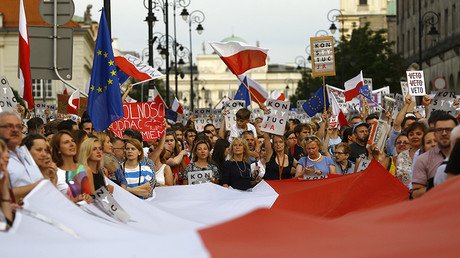‘Question mark’ hangs over Poland’s EU future amid rows with Brussels – Tusk
Poland's future within the EU is shrouded by a "question mark," European Council head Donald Tusk has warned. It comes amid ongoing rows between Brussels and Warsaw over the country's actions on its justice system, state media and the environment.
"There is a question mark over Poland's European future today," Tusk, who served as Poland's prime minister from 2007-2014, told reporters on Thursday.
"There are plenty of issues where the Polish government's actions seem very controversial from the point of view of the whole EU. Including Budapest, sometimes," Tusk said, referring to Poland's ally Hungary.
Tusk's comments come amid ongoing differences between Warsaw and Brussels, over moves by the ruling conservative Law and Justice party (PiS) to expand its powers.
One of the points of contention regards Poland's courts, after a recent bill was approved by President Andrzej Duda, allowing the country's justice minister to hire and fire senior judges who head the lower courts.
The move sparked protests in the streets and prompted the EU to threaten ramifications against Warsaw for limiting judicial independence. Poland responded by accusing Brussels of "blackmail."
The EU's threats against Poland came despite the country's president vetoing two other bills passed by parliament. One of those would have required all Supreme Court judges to step down and given the justice minister the power to decide who should stay on. The other would have given politicians control over who sits on the National Judiciary Council, the body which nominates Supreme Court judges.
Referencing the judiciary row, Tusk said that he understands the "emotions of Poles who are concerned about courts, or Poland's future in the EU."
Another source of tension between Poland and the EU regards the Bialowieza forest, a UNESCO World Heritage Site. Activists and the EU claim Poland has ignored a European Court of Justice (ECJ) ruling to halt logging in the forest.
"The fact that a European tribunal decision is rejected so arrogantly is evidence of something very dangerous in my opinion — it is an overt attempt to put Poland in conflict with the European Union," Tusk said.
"For me, this hints of a prelude to an announcement that Poland does not need the European Union and the European Union does not need Poland... I am afraid that we are closer to that point than further."
However, Warsaw initially stated that the only logging that had been taking place at the site was in order to control a beetle outbreak.
It said on Thursday that it was currently only removing dead and weak tree trunks for safety purposes.
"Thus, the actions being conducted are in line with the ECJ decision," the Environment Ministry said.
Meanwhile, Brussels has also expressed concern that Poland is trying to tighten its grip on state media.
Tusk was confirmed for his second term as the president of the European Council in March, despite objections from the Polish government.














